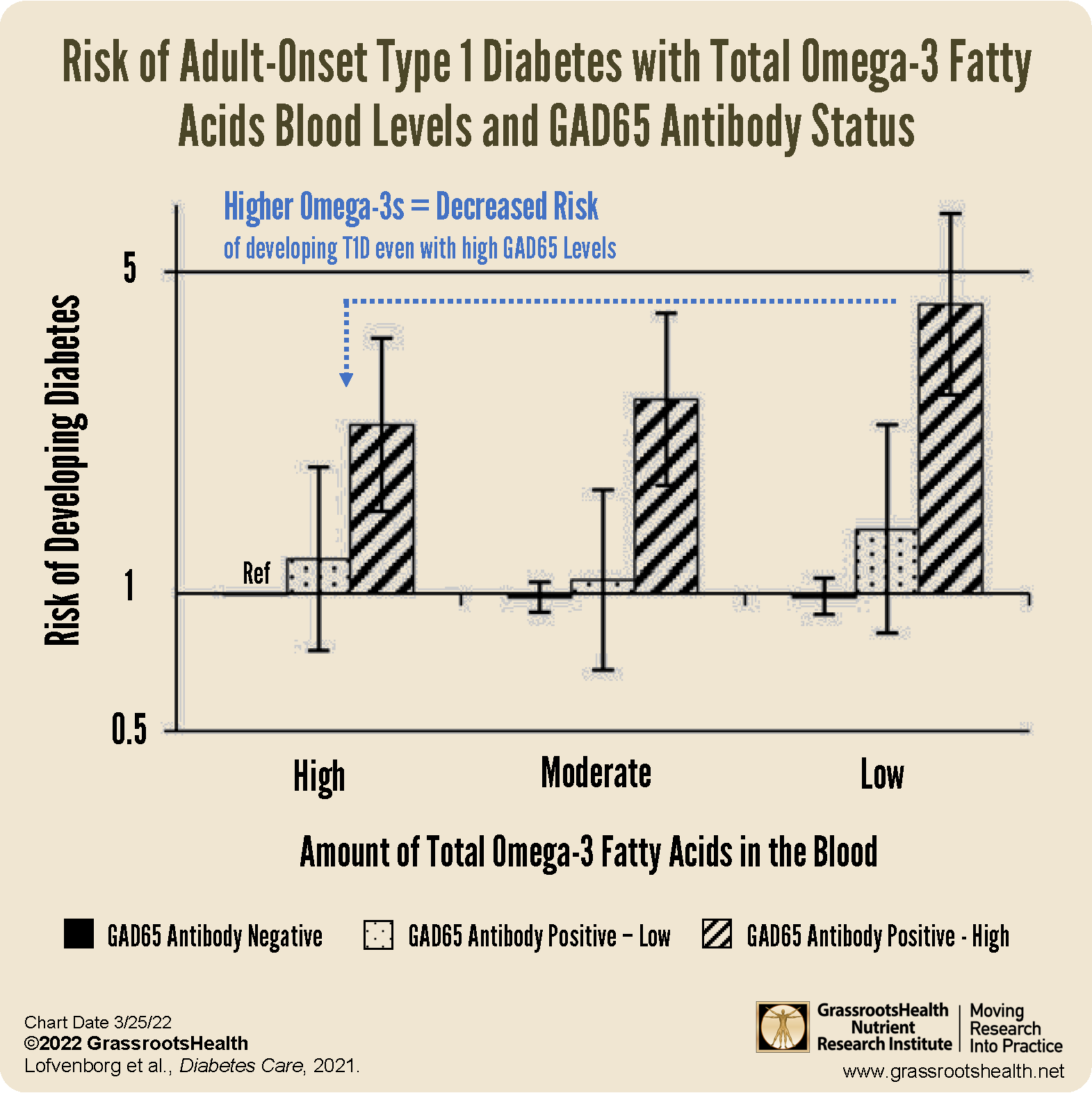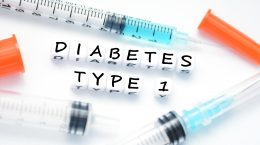Published on March 27, 2022
Study finds that higher fish intake and higher omega-3 status may prevent or prolong diabetes onset even among GAD65 antibody–positive individuals
Key Points
- The presence of islet cell autoantibodies indicates an autoimmune response against the cells of the pancreas, and is strongly associated with development of T1D, with the GAD65 antibody being the one most commonly found in patients with adult-onset T1D
- A study found that those who were GAD65 positive and also had low fish intake had a significantly higher risk of diabetes, with more than a fourfold risk of diabetes among those with both high levels of GAD65 antibodies and low omega-3s compared to those who were negative for GAD65 and had high omega-3 levels
- To investigate the combined effect of omega-3 fatty acids and vitamin D on T1D prevention, GrassrootsHealth is running a study for individuals at a high risk for T1D, including those who are positive for auto-antibodies

Type 1 diabetes (T1D) is a chronic autoimmune disease characterized by the destruction of insulin-producing pancreatic beta cells. Studies have linked a higher vitamin D and omega-3 status with lower T1D risk, which may be due to the anti-inflammatory properties of vitamin D and omega-3s since chronic inflammation has also been associated with the development and progression of T1D.
The presence of islet cell autoantibodies (such as IAA, GAD65, IA-2A, ZnT8, and ICA) indicates an autoimmune response against the cells of the pancreas, and is strongly associated with development of T1D. The GAD65 antibody is the one most commonly found in patients with adult-onset T1D.
Investigating the Relationship Between Omega-3s, GAD65 Antibody Levels, and T1D
A study by Lofvenborg et al. looked to see if there was a relationship between fish intake and/or omega-3 fatty acid levels in the blood, GAD65 antibody positivity, and adult-onset type 1 diabetes.
Data from 11,247 cases of adult onset T1D (who were non-diabetic at baseline yet developed diabetes during the study follow-up time) along with 14,288 non-diabetic controls was used; there was a median follow-up time of 6.5-6.9 years. The data included fish intake and baseline blood sample results for GAD65 antibodies and omega-3 fatty acid levels. A positive GAD65 level was defined as at least 65 units/mL, and a high level was defined as at least 167.5 units/mL. Fish intake and omega-3 levels were divided into tertiles for analysis.
What were the results of the study?
The study found that those who were GAD65 positive and also had low fish intake had a significantly higher risk of diabetes, with more than a fourfold risk of diabetes among those with both high levels of GAD65 antibodies and low omega-3s compared to those who were negative for GAD65 and had high omega-3 levels.
The authors conclude “High fish intake or relative plasma phospholipid n-3 PUFA concentrations may partially counteract the increased diabetes risk conferred by GAD65 antibody positivity… This suggests that intake of dietary fish, especially fatty fish, may prevent or prolong diabetes onset in GAD65 antibody–positive individuals.”
Measure Omega-3 Fatty Acid Status with the Omega-3 Index
The Omega-3 Index is a blood test that measures the amount of omega-3 fatty acids (EPA and DHA) in red blood cell (RBC) membranes and is expressed as a percent of total RBC fatty acids. It is a long-term and stable marker of omega-3 status. Scientists recommend a target Omega-3 Index of 8% or higher. Testing is essential, as there is a large amount of variability in the omega-3 status for different people with the same intake amount (similar to vitamin D!). For example, a GrassrootsHealth analysis showed that the range of response with 1000 mg of EPA+DHA per day was 5.7% to 10.2%. Therefore, it is recommended that individuals measure their Omega-3 Index and determine a personalized dose using the Omega-3 calculator to achieve a minimum Omega-3 Index of 8%.
To investigate the combined effect of omega-3 fatty acids and vitamin D on inflammation and T1D prevention, GrassrootsHealth is running a study for individuals at a high risk for T1D, including those who are positive for auto-antibodies (i.e. immune system molecules that attack insulin producing cells) or have a close family member with T1D. Learn more here.
Could Your Omega-3 and Vitamin D Levels be Improved? Measure them At-Home Today!
Make sure you know your Omega-3 Index (target of at least 8%) and your vitamin D level (target of 40-60 ng/ml or 100-150 nmol/L), and are taking daily steps to keep both within range.
 Having and maintaining healthy vitamin D levels and other nutrient levels can help improve your health now and for your future. Choose which additional nutrients to measure, such as your omega-3s and essential minerals including magnesium and zinc, by creating your custom home test kit today. Take steps to improve the status of each of these measurements to benefit your overall health. With measurement you can then determine how much is needed and steps to achieve your goals. You can also track your own intakes, symptoms and results to see what works best for YOU.
Having and maintaining healthy vitamin D levels and other nutrient levels can help improve your health now and for your future. Choose which additional nutrients to measure, such as your omega-3s and essential minerals including magnesium and zinc, by creating your custom home test kit today. Take steps to improve the status of each of these measurements to benefit your overall health. With measurement you can then determine how much is needed and steps to achieve your goals. You can also track your own intakes, symptoms and results to see what works best for YOU.
Enroll in D*action and Test Your Levels Today!






